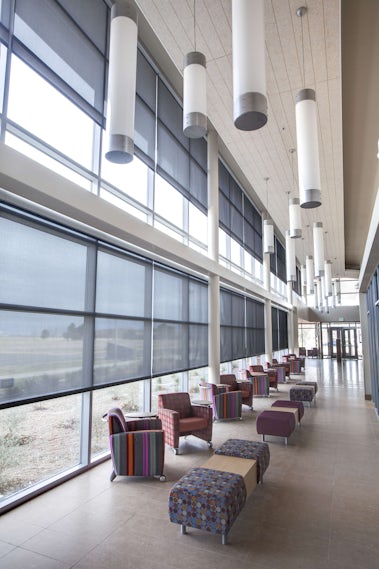IF YOU’RE AN ARCHITECT, CONTRACTOR, OR DIY-ER, YOU PROBABLY ALREADY KNOW HOW DIFFICULT AND TIME CONSUMING IT CAN BE TO RESEARCH AND SELECT THE BUILDING PRODUCTS THAT ARE RIGHT FOR YOUR NEXT PROJECT. LUCKILY, ARCHITIZER IS HERE TO HELP: USING OUR PRODUCT CATALOG, WE’VE WRITTEN A COLLECTION OF “SPEC GUIDES” ON EVERYTHING FROM MARBLE TO SURFACE-MOUNTED LIGHTING. THESE WILL HELP YOU UNDERSTAND WHAT FACTORS TO CONSIDER BEFORE MAKING YOUR NEXT SPECIFICATION OR PURCHASE. THINK OF THEM AS THE ULTIMATE SPECIFIER CHEAT SHEET.
Awnings
Categorization
Architizer: Accessories > Window Treatments > Awnings
Masterspec: 107313
MasterFormat: 10530
Introduction + Tips
Ordering an awning is a relatively straightforward process, and manufacturers are good at customizing awnings to fit the exact needs of your project. The most difficult question you’ll likely face is what type of fabric to select, because there are so many colors, textiles, and performance features from which to choose. But we’ve outlined the most important considerations for you, and provided links to some of the biggest fabric manufacturers around. If you want a metal or vinyl awning, that’s easy too! Just follow some of the links that we’ve provided to get an idea of the shape and material that you want. And remember: use normal words to describe what you’re after, and pictures to demonstrate the type of aesthetic you’re interested in. Our suppliers will do the rest!
Application
- Where
- Residential – suburban
- Residential – urban
- Commercial – suburban
- Commercial – urban
- Placement
- Entrance/door
- Patio (canopy)
- Street/sidewalk
- Walkway (canopy)
- Window
Dimensions
Awnings come in every imaginable size, and are customized to fit your project. Provide the height, length and depth of the walls, patios, doors or windows that the awning should cover. If your project includes multiple awnings of different dimensions, be sure to specify each of them.
Aesthetic
- Material & Color
- Fabric: Most awnings are lightweight metal frames over which a fabric cover is fastened. If you have a specific fabric in mind, let us know and provide a link to its manufacturer, if possible. If you aren’t certain what fabric you’d like to use, you can still specify any of its desired characteristics, eg. color, thread pattern, or perforation. Consider searching the following popular brands for ideas:
- Metal, Glass or Vinyl: Rigid awnings often imitate gabled roofing, but they come in a variety of other styles as well. You can visit the following to get some ideas:
- Shape: Awnings vary greatly in shape, from domed to convex to gabled. Some of these shapes are associated with specific awning uses, like for windows or canopied walkways. Others have exposed frames, which can be customized according to finish or color. You can view some different varieties here and here. If you can’t find what you’re looking for, upload an image.
- Graphics/Signage: Many awnings display store logos or other designs. These are applied digitally, through screen printing, or by hand. If your awning need graphics, specify this.
- Light & Heating: Awnings sometimes incorporate lights to illuminate entrances and walkways at night, and heaters during the colder months. Oftentimes these are purchased and installed separately from the manufacture of the awning, but let the manufacturers know if you want yours to incorporate lights and/or heaters.
- Freestanding or attached: Most awnings are mounted to a wall. If you have a particularly large awning, or a patio or walkway canopy, you may need to employ perimeter, central or cantilevered upright columns.
Performance
- Retraction
- Manual
- Motorized
- Fixed
- Remote Control
- Fabric Performance: The average project’s awning won’t require all of the bells and whistles listed below; that said, most industry-standard awning fabrics already come with:
- Flame retardance
- Fade resistance
- Abrasion resistance
- Chemical resistance
- Breathability
- Good stretch and recovery
- Dimensional stability
- Thermal protection
- UV resistance
- Anti-microbial & anti-fungal
- Weather resistance
- Light control
- Stain resistance
- Easy to clean / bleach cleanable
Visit Architizer’s Product Catalog to check out the latest awning products.
Does your company manufacture awnings? Click here to learn more about listing your product on Architizer. If you have comments, questions or suggestions let us know in the comments section below.
External Links:
Sunbrella
Glen Raven
Dickson-Constant
Herculite
Eide Industries
Design Your Awning
LightLine
Victory Awning




